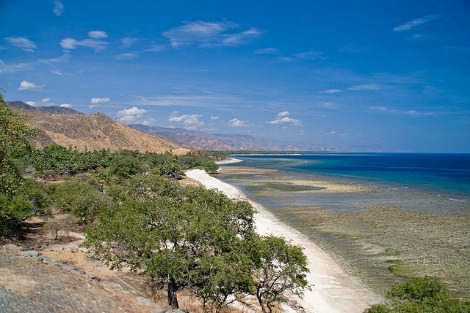There has been an agreed breakthrough in the long running dispute between Australia and Timor Leste in relation to maritime boundary demarcation and control of the resources in the disputed area in the Timor Sea. The breakthrough came on 30 August, the 18th anniversary of the bloody referendum at which the Timorese voted for their independence from Indonesia.
 The terms of the deal remain confidential. But the Permanent Court of Arbitration which is overseeing the Conciliation Commission convening the two parties meeting in Copenhagen has issued a press release noting that they have 'have reached agreement on the central elements of a maritime boundary delimitation' and they have agreed to 'the establishment of a Special Regime for Greater Sunrise'.
The terms of the deal remain confidential. But the Permanent Court of Arbitration which is overseeing the Conciliation Commission convening the two parties meeting in Copenhagen has issued a press release noting that they have 'have reached agreement on the central elements of a maritime boundary delimitation' and they have agreed to 'the establishment of a Special Regime for Greater Sunrise'.
It would seem that the gamble taken by the Timorese in January 2017 has paid off. Back then, the Timorese leaders decided to terminate the 2006 CMATS Treaty which had given them control over the fishing resources inside the disputed area and had increased their upstream revenue share in the Greater Sunrise deposit from 18 per cent to 50 per cent. In exchange for this, Australia won a concession that boundary negotiations would be suspended for 50 years.
In part, Australia did not want to upset the apple cart in Indonesia because earlier maritime boundary negotiations between Australia and Indonesia had yielded Australia a very good outcome. If the Timorese were to cut a better deal, the Indonesians might want to revisit some of their earlier arrangements.
CMATSallowed Australia to kick the can further down the road, putting off any further reckoning with the Indonesians. CMATS was a good deal for Australia and Timor Leste in 2006, but it reached its use-by date once the Timorese lost interest in the development of Sunrise without the prospect of onshore development in Timor. The Timorese claimed they had compelling legal advice from some of the leading international lawyers in the UK that they would be entitled to the whole of the Greater Sunrise deposit once maritime boundaries were negotiated according to the contemporary principles of international law.
Given that there is to be 'a special regime for Greater Sunrise', the parties must have agreed that the resource will still be shared between them, or at least that the resource still straddles both jurisdictions. This is a major concession by the Timorese. Presumably there will be an advantageous trade-off for them having made this concession after having constantly claimed that the whole of the Greater Sunrise would fall within their jurisdiction.
Welcoming the deal, former Timorese President and Chief Negotiator Xanana Gusmao has spoken about achieving 'our dream of full sovereignty' and finally settling maritime boundaries with Australia. He has hailed this as an historic agreement which 'marks the beginning of a new era in Timor-Leste's friendship with Australia'. Timor's agent in the proceedings Minister Agio Pereira, has given all the credit to Gusmao as the father of the nation. Australia's Foreign Minister has said that the agreement 'supports the national interest of both our nations'.
In the past, the sticking point has always been the downstream development of the Greater Sunrise deposit. The joint venturers in the past have favoured the use of FLNG, processing and freezing the gas on a floating platform in the Timor Sea. Their second option has been to pipe the gas all the way to Darwin, arguing that this can be done economically by linking up with the pipeline which already runs from Bayu Undan to Darwin, and on a moderately shallow ocean floor. The Timorese have long demanded that any settlement include the piping of the gas across the deep Timor Trough to the south of Timor Leste so that the processing might be done onshore, allowing them to export Timor Gas to the world.
"The announcement is good news for all persons on both sides of the Timor Sea who seek justice and reconciliation following upon the troubled and uncertain times since the Portuguese left their colonial heritage in 1975."
It is very good news that the two governments have reached agreement on 'a pathway to the development of the resource, and the sharing of the resulting revenue'. Given the stand-off in the South China Sea, Timor's agent Agio Pereira is right to express pride and satisfaction that 'with our joint success at resolving our dispute through this conciliation process, Timor-Leste and Australia hope to have set a positive example for the international community at large'.
The announcement is good news for all persons on both sides of the Timor Sea who seek justice and reconciliation following upon the troubled and uncertain times since the Portuguese left their colonial heritage in 1975. The parties still have a lot of work to do to finalise the agreement by October 2017. But this breakthrough is a tribute to Gusmao, Pereira and Bishop reaching out across the Timor Gap.
 Frank Brennan SJ is the CEO of Catholic Social Services Australia.
Frank Brennan SJ is the CEO of Catholic Social Services Australia.